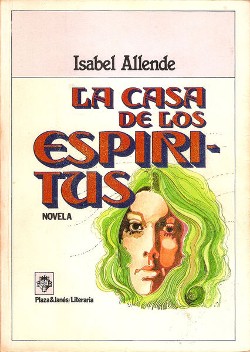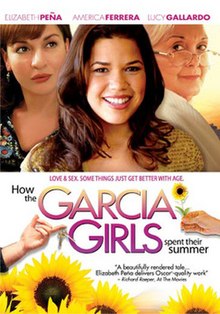
The House of the Spirits is a 1993 period drama film directed by Bille August and starring Jeremy Irons, Meryl Streep, Glenn Close, Winona Ryder, Antonio Banderas and Vanessa Redgrave. The supporting cast includes María Conchita Alonso, Armin Mueller-Stahl, and Jan Niklas. Based on the 1982 novel of the same name by Isabel Allende, the film follows three generations of women from a Chilean family during the country’s military dictatorship.

The House of the Spirits is the debut novel of Isabel Allende. The novel was rejected by several Spanish-language publishers before being published in Buenos Aires in 1982. It became an instant best-seller, was critically acclaimed, and catapulted Allende to literary stardom. The novel was named Best Novel of the Year in Chile in 1982, and Allende received the country's Panorama Literario award. The House of the Spirits has been translated into over 20 languages.

America Georgina Ferrera is an American actress. She has received numerous accolades, including a Primetime Emmy Award, a Golden Globe Award, and a Screen Actors Guild Award, among others. In 2007, Time named her one of the 100 most influential people in the world.

Real Women Have Curves is a 2002 American comedy-drama film directed by Patricia Cardoso, based on the play of the same name by Josefina López, who co-authored the screenplay for the film with George LaVoo. The film stars America Ferrera as protagonist Ana García. It gained fame after winning the Audience Award for best dramatic film, and the Special Jury Prize for acting in the 2002 Sundance Film Festival. The film went on to receive the Youth Jury Award at the San Sebastian International Film Festival, the Humanitas Prize, the Imagen Award, and Special Recognition by the National Board of Review. According to the Sundance Institute, the film gives a voice to young women who are struggling to love themselves and find respect in the United States.

El derecho de nacer is a Mexican telenovela produced by Ernesto Alonso for Televisa in 1981. Based on the Cuban radionovela of the same name written by Félix B. Caignet adapted for TV by Fernanda Villeli and directed by Raúl Araiza.

Topacio is a 1984 Venezuelan telenovela produced by RCTV based on the telenovela by Delia Fiallo Esmeralda produced by rival network Venevisión in 1970. It starred Grecia Colmenares and Víctor Cámara and with the antagonistic participations of Nohely Arteaga, Alberto Marín and Chony Fuentes.

Los ricos también lloran is a popular telenovela produced in Mexico in 1979, starring Verónica Castro, Rogelio Guerra and Rocío Banquells. Castro also sang the theme Aprendí a Llorar, a song written by Lolita de la Colina. The telenovela was produced by Valentín Pimstein and Carlos Romero, it was directed by Rafael Banquells. The story was written by Inés Rodena and adapted by Valeria Philips.

Tropico is a telenovela produced and filmed entirely in the Dominican Republic by Venevisión International, Iguana Productions and Antena Latina. It is a remake of the 1997 Peruvian telenovela Escándalo.

Don Amor is a Chilean television soap opera created by José Ignacio Valenzuela, that aired on Canal 13 from March 3, to September 1, 2008, starring Ignacia Baeza, Jorge Alberti, Carolina Arregui, Jorge Martínez and Nydia Caro.

Marisol is a Mexican telenovela produced by Juan Osorio for Televisa in 1996. Telenovela is a remake of the 1977 Mexican telenovela Marcha nupcial. Famous and beloved Enrique Álvarez Félix died after he finished his work in Marisol.
Ada Carrasco was a Mexican film and television actress.

Hasta que el dinero nos separe is a Mexican telenovela premiered on Canal de las Estrellas on June 29, 2009, and concluded on May 16, 2010. The series is created and produced for Televisa by Emilio Larrosa, based on the Colombian telenovela Hasta que la plata nos separe written by Fernando Gaitán. It stars Pedro Fernández and Itatí Cantoral as the titular characters.

Sonny Kiriakis is a fictional character from Days of Our Lives, an American soap opera on the NBC network. The role was originally portrayed by Freddie Smith. Sonny is the only biological child of Justin Kiriakis and Adrienne Johnson Kiriakis. Sonny's birth was announced in 1991. Developed under head writer Dena Higley, Sonny was introduced in 2011 by executive producers Ken Corday and Gary Tomlin as Justin and Adrienne's openly gay son – the show's first regular character to be openly gay. His major stories included a gay bashing storyline and the development of his romance with Will Horton who is just coming to terms with his own sexuality. In 2014, Will and Sonny marry, becoming the first male-male couple to legally marry in the history of American daytime television drama. Sonny is also known for his friendship and business dealings with Chad DiMera – a friendship that nearly gets him killed when their sports website is taken over by an illegal gambling operation.

Qué bonito amor is a Mexican telenovela produced by Salvador Mejía Alexandre for Televisa that aired on Canal de las Estrellas from October 22, 2012, to June 2, 2013. It is based on La Hija del Mariachi, produced by Colombian's RCN Television and written by Mónica Agudelo in 2006–2007. Production of Qué bonito amor officially started on August 9, 2012. In the United States the telenovela aired on Univision from April 15, 2013, to October 4, 2013.
Mexican sex comedies are films within the comedy film genre of the Mexican cinema industry, though in a class of their own. The storylines typically revolve around themes of sexploitation and "Mexploitation". They are mostly recognized as low-quality films with fairly low budgets. The genre peaked in popularity in the 1970s and 1980s. Although the films had sexually suggestive plots and used numerous comedic innuendos and double entendres, they were not overtly explicit, and were never considered to be pornographic. Furthermore, it was not uncommon for the male characters in these films to comedically fail in their attempts to win over, or have sex with, the female characters. When a man was successful in wooing a woman, the performances were deliberately over-exaggerated and pantomime-like, aiming to generate laughter more than arousal. The genre is similar to, and possibly influenced by, Italian erotic comedies. The popular term "ficheras films" came from the film Las ficheras, produced and released in 1975, which told the stories and experiences of many dancing women who entertained men at nightclubs.
Pobre juventud is a Mexican telenovela produced by Carla Estrada for Televisa in 1986. It is from an original story by Félix B. Caignet, adapted by Marcia del Río and directed by Pedro Damián.
Buscando el paraíso is a Mexican telenovela produced by Luis de Llano Macedo and Marco Flavio Cruz for Televisa in 1993.
Seis Hermanas is a Spanish soap opera produced by Bambú Producciones for Televisión Española that originally aired on La1 from April 22, 2015 to April 21, 2017. It starred María Castro, Carla Díaz, Mariona Tena, Celia Freijeiro, Marta Larralde and Candela Serrat.
Acacias 38 is a Spanish soap opera television series produced by Boomerang TV for Televisión Española (TVE) that originally aired on La1 from 2 April 2015 to 13 May 2021. The fiction is set in building 38 Acacias Street, in Madrid. The start of the series was set in 1899. By the fifth season, it was set in 1913. The seventh season took a 5-year time leap to 1920.













